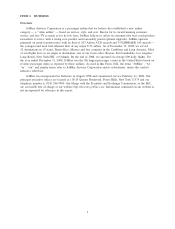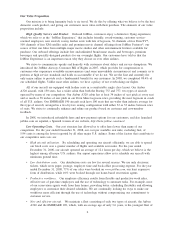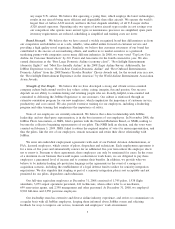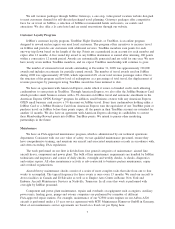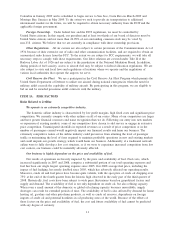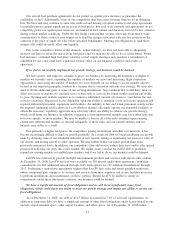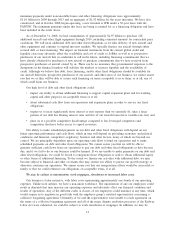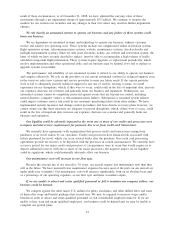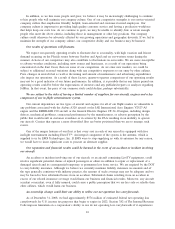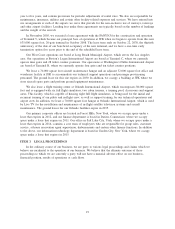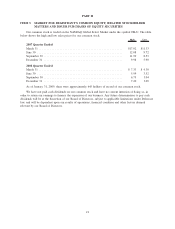JetBlue Airlines 2008 Annual Report Download - page 20
Download and view the complete annual report
Please find page 20 of the 2008 JetBlue Airlines annual report below. You can navigate through the pages in the report by either clicking on the pages listed below, or by using the keyword search tool below to find specific information within the annual report.Colombia in January 2009 and is scheduled to begin service to San Jose, Costa Rica in March 2009 and
Montego Bay, Jamaica in May 2009. To the extent we seek to provide air transportation to additional
international markets in the future, we will be required to obtain necessary authority from the DOT and the
applicable foreign government.
Foreign Ownership. Under federal law and the DOT regulations, we must be controlled by
United States citizens. In this regard, our president and at least two-thirds of our board of directors must be
United States citizens and not more than 24.99% of our outstanding common stock may be voted by
non-U.S. citizens. We believe that we are currently in compliance with these ownership provisions.
Other Regulations. All air carriers are also subject to certain provisions of the Communications Act of
1934 because of their extensive use of radio and other communication facilities, and are required to obtain an
aeronautical radio license from the FCC. To the extent we are subject to FCC requirements, we will take all
necessary steps to comply with those requirements. Our labor relations are covered under Title II of the
Railway Labor Act of 1926 and are subject to the jurisdiction of the National Mediation Board. In addition,
during periods of fuel scarcity, access to aircraft fuel may be subject to federal allocation regulations. We are
also subject to state and local laws and regulations at locations where we operate and the regulations of
various local authorities that operate the airports we serve.
Civil Reserve Air Fleet. We are a participant in the Civil Reserve Air Fleet Program which permits the
United States Department of Defense to utilize our aircraft during national emergencies when the need for
military airlift exceeds the capability of military aircraft. By participating in this program, we are eligible to
bid on and be awarded peacetime airlift contracts with the military.
ITEM 1A. RISK FACTORS
Risks Related to JetBlue
We operate in an extremely competitive industry.
The domestic airline industry is characterized by low profit margins, high fixed costs and significant price
competition. We currently compete with other airlines on all of our routes. Many of our competitors are larger
and have greater financial resources and name recognition than we do. Following our entry into new markets
or expansion of existing markets, some of our competitors have chosen to add service or engage in extensive
price competition. Unanticipated shortfalls in expected revenues as a result of price competition or in the
number of passengers carried would negatively impact our financial results and harm our business. The
extremely competitive nature of the airline industry could prevent us from attaining the level of passenger
traffic or maintaining the level of fares required to maintain profitable operations in new and existing markets
and could impede our growth strategy, which would harm our business. Additionally, if a traditional network
airline were to fully develop a low cost structure, or if we were to experience increased competition from low
cost carriers, our business could be materially adversely affected.
Our business is highly dependent on the price and availability of fuel.
Our results of operations are heavily impacted by the price and availability of fuel. Fuel costs, which
increased significantly in 2007 and 2008, comprise a substantial portion of our total operating expenses and
fuel has been our single largest operating expense since 2005. Our 2008 average fuel price, including the
impact of fuel hedging, has nearly doubled since 2005, which has adversely affected our operating results.
Moreover, crude oil and fuel prices have become quite volatile, with the spot price of crude oil dropping over
75% at the end of the fourth quarter from the historic high observed in the early part of the third quarter of
2008. Historically, fuel costs have been subject to wide price fluctuations based on geopolitical factors and
supply and demand. The availability of fuel is not only dependent on crude oil, but also refining capacity.
When even a small amount of the domestic or global oil refining capacity becomes unavailable, supply
shortages can result for extended periods of time. The availability of fuel is also affected by demand for home
heating oil, gasoline and other petroleum products, as well as crude oil reserves, dependence on foreign
imports of crude oil and potential hostilities in oil producing areas of the world. Because of the effects of
these factors on the price and availability of fuel, the cost and future availability of fuel cannot be predicted
with any degree of certainty.
11


